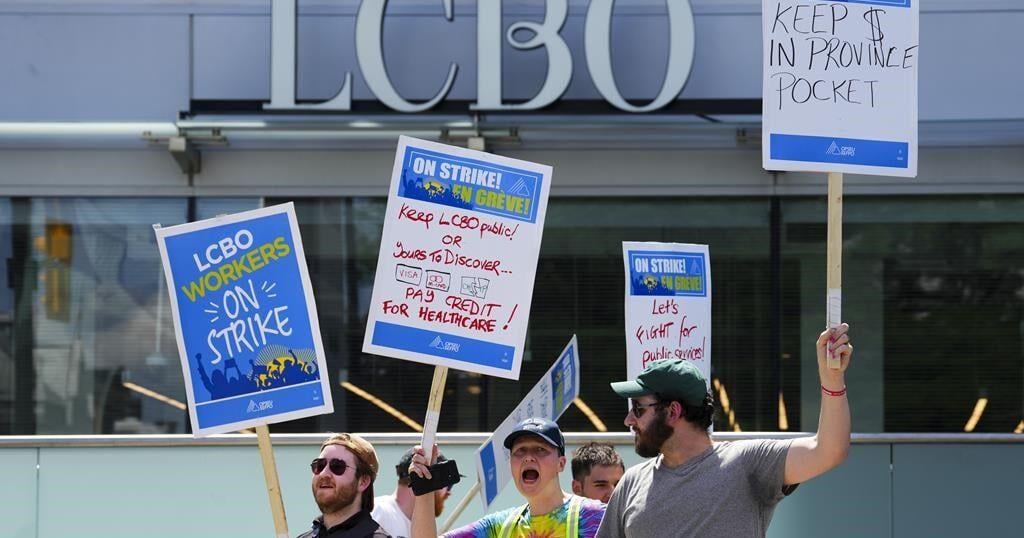TORONTO – The Liquor Control Board of Ontario and the union representing 10,000 of its workers reached a tentative contract deal Friday to end a two-week-old strike.
The LCBO said in a statement that the tentative agreement will end the strike at 12:01 a.m. on Monday if it is ratified and the retailer is planning to reopen stores on Tuesday.
“We look forward to welcoming our unionized employees back to work in service of Ontarians,” the LCBO wrote in its statement.
“We recognize the disruption the strike caused for our employees, partners, and customers who rely on our services, and we thank everyone for their continued patience and understanding as we begin resuming regular operations.”
Workers represented by the Ontario Public Service Employees Union walked off the job July 5 and negotiations had resumed on Wednesday this week.
No details were immediately available about the terms of the agreement, but OPSEU trumpeted the deal reached after the first strike in the LCBO’s history.
“Workers went on strike to protect their jobs and LCBO revenues supporting public services – this agreement just does that,” the union wrote in a statement.
OPSEU had said the dispute was largely about Premier Doug Ford’s plan to allow convenience and grocery stores to sell ready-to-drink cocktails. The union has said expanded sales of ready-to-drink beverages will threaten their jobs.
The LCBO had said that wasn’t a matter for the bargaining table. The last offer that it made public included wage increases of seven per cent over three years, a special adjustment for certain warehouse positions, improving access to benefits for casual part-timers, converting about 400 casual workers to permanent full time, and improving severance provisions.
Finance Minister Peter Bethlenfalvy said he was pleased the two sides reached a tentative agreement.
“This is a good deal for workers and welcome news for Ontarians,” he wrote in a statement. “We look forward to working together to deliver choice and convenience across Ontario.”
During the strike, the Ford government has been forging ahead with its alcohol expansion plans. Ford sped up the date when grocery stores already licensed to sell beer and wine could add the pre-mixed cocktails and coolers to their offerings.
Those grocers could place orders for the beverages starting Thursday and by Friday some were already appearing on store shelves.
Pushing that step two weeks earlier than planned is part of an already fast-tracked timeline to expand alcohol sales in the province.
Ford’s previous plan was to get beer, wine and ready-to-drink cocktails in convenience stores and all grocery stores by 2026, but in May he announced that would instead happen this year.
An “early implementation agreement” with The Beer Store involves the province paying the company up to $225 million to help it keep stores open and workers employed. The province is also giving brewers a rebate on an LCBO fee that normally brings in $45 million a year, and it is giving retailers a 10 per cent wholesale discount.
Liberal Leader Bonnie Crombie has claimed the early implementation will actually cost $1 billion, which the government disputes, and she said the strike was entirely avoidable.
“Doug Ford has used the LCBO as a political pawn in his plan to give $1 billion of your money to the big grocers and international breweries,” she wrote in a statement.
“Why couldn’t Doug just wait a year and spend your money on things that actually matter?”
Convenience stores will be allowed to sell beer, wine and coolers starting Sept. 5 while newly licensed grocery stores can do so starting Oct. 31.
During the strike the LCBO had been fulfilling orders online and for licensees such as bars and restaurants, but those venues had said their supplies were becoming strained as the strike neared the two-week mark.
This report by The Canadian Press was first published July 19, 2024.

























